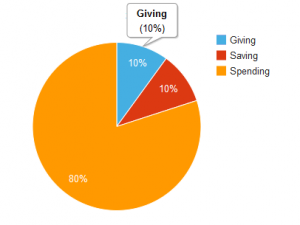The theoretical basis for the 10/10/80 principle is the famous Pareto Principle. The Pareto Principle was suggested by the Italian economist Vilfredo Pareto who postulated that approximately 80% of the effects result from 20% of the causes. Pareto originally observed that 80% of the wealth in Italy belonged to 20% of inhabitants, for example. Over subsequent years, many similar distributions were observed. In large companies, for instance, 20% of the products often account for 80% of sales. In academia, 20% of the researchers may be responsible for 80% of the discoveries. In terms of personal time management, 80% of your work-related output could come from only 20% of your time at work. This Principle, also referred to as the 80–20 rule, the law of the vital few and the principle of factor sparsity, has been adopted in management to help managers stay focused on the “20 percent that matters”. Of all the tasks performed throughout the day, one could say (based on Pareto’s Principle) that only 20 percent really matter.
Similarly in money management there’s a 10/10/80 principle to help in budgeting. The 10/10/80 principle aims to allocate 10% of your income to savings, another 10% to charitable giving and the remaining 80% to living expenses. It was very interesting for me to see that this principle has been in existence for more than 400 years and yet people don’t seem to get a hang of it. I found examples of people who followed this principle centuries ago and found it amazing. John Wesley, an old-time preacher, founder of the Methodist denomination and evangelist in the 1700’s followed this principle. John D. Rockefeller, an American industrialist who was the wealthiest man of his generation also followed the principle. When asked what the secret of his financial success was, he gave a profoundly simple answer that from his very first paycheck, he gave 10%, saved 10% and lived on only 80%. As his wealth grew, so did his giving, primarily to educational and public health causes, but also for basic science and the arts. Interesting, isn’t it?
This then goes on to tell us that as an individual or a family you do not require more than 80% of your earnings to live comfortably. You need only to 80% of your income for food, utilities, rent, clothing and other necessities. This is not something that should work for children alone because they don’t have much needs. Some people have a hard time with this. I know for some people, asking them to save 10% seems totally outrageous and asking them to give 10% is utterly ridiculous! It seems really impossible. I’m here to assure you that it’s not. I’m also here to tell you that your best financial life can be accomplished by having a proper balance of your money.
Give 10% – Giving your money away, to a church, to a charity, or to a great cause, does not only benefit those you give it to, it also benefits you even more than the person/people you give to. When you give your money away freely, with no strings attached, you feel good about yourself. When you give, just for the sake of giving, you open the door to receiving more. It’s a phenomenon that’s been around as old as time. What you sow you will also reap. When you give your money away selflessly, new opportunities and blessings find you. You can only understand it when you experience it. Start now if you have never made it a culture. It pays.
Save 10% – This is the pay yourself first principle. I am sure we have heard that said severally. It simply means setting aside 10% of your income consistently over your working life towards your financial freedom. It helps to ensure that you will have something enough to sustain you in your later years or whenever you plan to become financially free. After you have saved consistently then you begin to invest it. It is not supposed to be for emergency or when you are broke. It is money for the future to ensure you can make your money work for you.
Spend 80% – This is for the rest of your monthly expenses. Everything else in your life needs to fit into this remaining amount. So if you need to make more money to make that a reality, then you need to start right away. I have some tips on how you can also divide this 80% to help you enjoy every aspect of life. We will also discuss the pros and cons of following the 10/10/80 principle :), so stay with me as we do so from tomorrow.
You’ll discover that following this principle will make you a happier person in general. It feels good to give and it feels good to have money in savings. What about you? Do you think it’s possible to live this way? Do you think it’s possible for you? Why or why not?
In the meantime, enjoy every bit of your Saturday!

You are realy doing a great job. Keep impacting and changing life with the truth.
Pingback: Children too can give | Gbonjubola Sanni
Pingback: Encourage your teen to make money | Gbonjubola Sanni
Pingback: My life isn’t about mine alone! | Gbonjubola Sanni
Great write up. Thank you for sharing